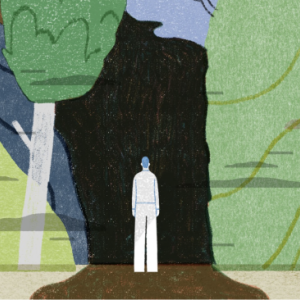As the Director of the Cleveland Brain Health Initiative, I wanted to reach out to you, the members of our community, with some scientific insight to support the range of emotions you or your loved ones are feeling. A grave personal illness. Loss of income. The death of a loved one. These traumatic events rank among the most stressful experiences a person can endure. Surrounded by this novel coronavirus pandemic, many of you, or people you know, are facing these stressors.
In addition to experiencing anxiety caused by uncertainty about our most immediate concerns (family, finances, disconnection, and isolation), many of us are also experiencing stress related to the unknown ramifications of this pandemic. When will we find new treatments or a vaccine? How long will quarantine orders go on? What will our country and communities look like when this is over? In the lab, there is a protocol for so-called “chronic unpredictable stress” that is known to cause anxiety and depression. We are going through this unpredicted chronic stress now. We actually do not know what will happen to us tomorrow, or the day after, or months in the future.
The current pandemic is not just a medical tragedy. Sadly, people will battle psychological scars from this trauma, long after the medical threat has disappeared. So what can we do to protect our mental health as we move through these unprecedented times? I’ve highlighted below key points from a recent article in The Nuance, “Science Explains Why Uncertainty Is So Hard on Our Brain” and hope it helps each of you understand the science behind your emotions.
Fear
In a 1927 essay, the legendary horror author H.P. Lovecraft wrote that “the oldest and strongest emotion of mankind is fear, and the oldest and strongest kind of fear is fear of the unknown.” What Lovecraft recognized — and decades of psychological research has borne out — is that the human brain is uniquely vulnerable to uncertainty. There’s evidence that an inability to tolerate uncertainty is a central feature of most anxiety disorders, and that uncertainty stokes the sorts of “catastrophic interpretations” that fuel panic attacks. As the world grapples with the nightmare that is the COVID-19 pandemic, and as the rhythms and rituals of American life are indefinitely disrupted, there are lessons to be learned from the research on uncertainty — including some helpful ways to defang it.
Worry
According to a 2014 study in the journal Nature Reviews Neuroscience, uncertainty disrupts many of the habitual and automatic mental processes that govern routine action. This disruption creates conflict in the brain, and this conflict can lead to a state of both hypervigilance and outsized emotional reactivity to negative experiences or information. In other words, uncertainty acts like rocket fuel for worry; it causes people to see threats everywhere they look, and at the same time it makes them more likely to react emotionally in response to those threats.
How to Cope
Different people respond to uncertainty in different ways. Unfortunately, many gravitate toward unhelpful coping strategies.
So what can we do to combat the effects of uncertainty? Many experts say focusing on the present can help dispel uncertainty and the anxiety it foments.
- Eat healthy and get more sleep
- Do things you enjoy
- Get out a book you’ve been meaning to read
- Watch a little Netflix, Hulu, and other streaming programs
- Talk with a friend on the phone — something that gets your brain into the present moment
- Carve out a specific time and place for worrying, don’t allow it to overwhelm your entire day. It should be the same time and place each day, train your brain to confine its worrying to a convenient time within your day
- Keep some level of physical activity – walk or jog around in neighborhood (with social distance) and stretch in your house
None of us is immune to the devastating impact of this pandemic. We are preoccupied with the added complexity of not only our health but that of our families, the health and safety of our co-workers, lab staff, students and hospital healthcare professionals, all of whom are risking their health to care for others.
I am grateful that President Barbara Snyder created an avenue for donations of personal protective equipment from our labs to the healthcare community, and to Dean Pam Davis and Mark Chance who have coordinated policy oversight to preserve our education and research programs across the campuses. However, if I can personally be a resource to you, please do not hesitate to reach out and let me know. We are in this together.
With best wishes for good health,
Lin Mei, MD, PhD
Director, Cleveland Brain Health Initiative
Allen C. Holmes Professor of Neurological Diseases


